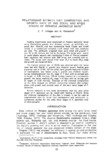Relationship between diet composition and growth rate of the zoeal and mysis stages of Penaeus japonicus Bate
Share
Abstract
Feeding experiments were conducted on Penaeus japonicus larvae using Chaetoceros gracilis plus Artemia nauplii, an artificially prepared diet (Diet-B), and two commercial feeds (Tapes and mysid meals) in a randomized complete block design with two replicates per diet. The artificially prepared diets were dried and ground to size 10 to 50 microns and fed to the larvae. The larvae were reared in round plastic aquaria each containing 5 liters of filtered seawater. Each aquarium was stocked with 250 larvae and provided with aeration. The larvae were reared from zoea (Z1) to mysis (M3) stage and growth was measured daily.
The highest survival rate of 34.2% was obtained when the larvae were fed with Diet-B. C. gracilis plus Artemia nauplii feeding gave a survival rate of 21.6%. On the other hand, growth measured in terms of development, was fastest using C. gracilis plus Artemia nauplii. Larvae metamorphosed into stage in 7 days with an average gain in length of 0.46 mm/day. Diet-B feeding resulted in a comparable growth, the larvae reaching M3 stage in 8 days with an average gain in length of 0.30 mm/day. Analyses of the chemical composition of the diets showed no definite relationship between diet composition and growth and survival rates of the early larval stages of P. japonicus.
Results obtained in this study demonstrate that the early larval stages of P. japonicus can be reared with feeding of Diet-B. Since the chemical composition of the diet is known, it can be used as supplemental data for larval feed development and nutritional requirements studies for the early larval stages of P. japonicus and/ or other penaeids.
Suggested Citation
Villegas, C. T., & Kanazawa, A. (1979). Relationship between diet composition and growth rate of the zoeal and mysis stages of Penaeus japonicus Bate. Fisheries Research Journal of the Philippines , 4(2), 32-40. http://hdl.handle.net/10862/1090
Subject
Collections
- AQD Journal Articles [1248]

